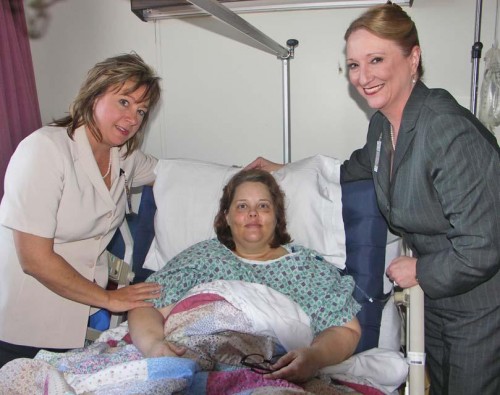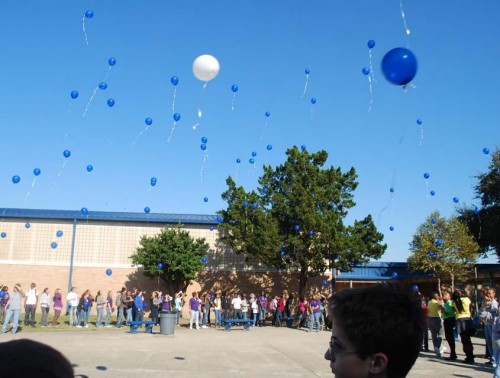
Chabert comes to aid of fellow workers’ families
November 23, 2010
LPSO deputies remembered via bike tour
November 25, 2010Some might wonder why a full service engineering and consulting firm like T. Baker Smith does not have its corporate offices in a city like Houston.
Kenneth “Kenny” Smith, the third-generation company head, admits he has considered it, but always comes back to remembering that Houma is home and that is where he intends to stay.
Smith is anticipating the one-year anniversary since he secured sole ownership of the family firm and is approaching the century mark of when his grandfather, T. Baker Smith, opened his surveying business in 1913. The company still bears his name.
“After Katrina [location] was a big question in my mind,” Smith said during a casual interview in his office 412 S. Van Ave.
“From a strictly business standpoint it makes a lot more sense for Kenny Smith to be in Houston, Texas. There’s no doubt. But in the end it came down to, ‘Where’s home?’ And Terrebonne Parish is. It’s deeply rooted in me from my father [Clifford Smith, now 75 and retired, who headed the firm from 1958 n 2001]. He spent his entire career proving to other colleagues throughout the country that you can service, and make a living and be prosperous in Terrebonne Parish,” the younger Smith said.
Smith intends to keep the corporate center in Houma, where his grandfather was the first professional surveyor ever in the region, and where T. Baker and Clifford were instrumental participants in developing an infrastructure that included the first paved roads in Terrebonne Parish n part of a WPA project n and completion of the Intracoastal Waterway in the 1930s as part of the elder Smith’s concept of “building a community.”
During its growth the company was also behind numerous flood protections and drainage projects in the 1960s, environmental work in the 1970s, grew with the oil and gas production industry during its struggles in the 1980s, fully entered the high tech world in the 1990s, then diversified its services and expanded with multiple locations in the first decade of the 21st century.
“In the engineering and surveying world the tools n slide rules, compasses, chains, and pins n basically stayed the same for 200 years,” Smith said. “Then in the mid-1970s computers started showing up and that changed everything.”
Smith admitted that when he graduated from Louisiana Tech University in 1986 and went to work for his father, Clifford was a bit reluctant to accept all his inexperienced boy’s fancy new concepts. “He went for the [technological changes] only because I was pushing him for it,” Smith said.
Kenny Smith credits Clifford Smith for teaching him that business means more than dollars and cents. It means investing in the community where one works and lives.
“My father has the greatest passion for Terrebonne Parish as anybody I’ve ever met,” Smith said. “Everything is geared toward the betterment of the community. In the last decade it has also been about saving the community from coastal erosion, getting a hurricane system built, protecting barrier islands and rebuilding wetlands to try and save this community.”
It was during Clifford Smith’s time leading T. Baker Smith that numerous pipeline projects, including the development of a parish-wide sewer construction program, were undertaken and completed. He also developed a master plan for the Houma-Terrebonne Airport. Through it all he held to the tag line, “Turning ideas into reality.”
Kenny Smith took over the company’s top spot in 2001 and implemented a corporate culture of value added technology, which includes electronic data collection, hydrographic surveying, information systems integration, and information management. His intention is to “add value to projects by exceeding our clients’ expectations.”
“We are not just [an engineering] company anymore,” Smith said. “We are a professional service corporation, a professional consulting company. We help people plan, design and build their projects. We have an engineering group. We have a pipeline design group. We have onshore and offshore surveying. We have environmental … construction management … we have an integrated business model.”
Value added technology, according to Smith, means coordinating their different tools to fit an integrated business model. Simply put, for him it is a matter of collecting data from a surveying standpoint and making use of technology to design a plan that is both environmentally friendly while achieving industrial project objectives.
“It’s a data collection [and] storage method. And the strategic clients are willing to pay for that,” he said. “What we really like being is a strategic partner with our clients. If you did only one thing you’d be a commodity. We’re not a commodity. We are a professional service, and professional services are [ones that] bring multiple things to the table.”
Smith admitted that if his grandfather’s rite of passage was keeping his business going through two world wars and the Great Depression, and his father’s challenges revolved around the growing pains of the oil industry in the Gulf of Mexico, his might well have arrived during the past year with the BP Deepwater Horizon explosion and oil spill and the federal government’s drilling moratorium.
T. Baker Smith has had an ongoing work relationship with BP, but during the spill crisis that occurred April 20, and, according to many business and environmental experts continues, the company took on a special work order to assist in cleanup efforts.
“Short term we helped respond for BP. We did a lot of different things. Our main [project] was making sure that all the cleanup activities stayed away from existing pipelines as much as possible and not make another mess,” Smith said.
When asked if he would have a different opinion of BP if he did not have ongoing contracts with the oil giant Smith responded, “That’s a great question. I don’t know.”
Smith then went on to explain his experiences with BP, which have kept him from vilifying that firm, as has been the case with much of the public opinion.
“My experience with BP as a client has been nothing but positive,” Smith said. Based on my experience I’m very supportive. I have confidence they are going to finish what they started.
“I realize that might not be a popular thing to say, but based on my experience, if [the Deepwater Horizon oil spill] had to happen I’m glad it happened with BP because I think they have more resources and commitment than most to make sure it gets fixed.”
Smith admitted that although the oil spill and moratorium might not have had an immediate negative impact on his business, it is something he is not taking for granted.
“It was a horrible event,” he said. “Several projects were put on hold. We stopped [some] because of it. We’re not really deepwater people so we didn’t have the immediate impact. But we’re all on the same food chain. We’re just a lot farther down.”
Smith recalled what his father had told him about working through difficult times. “He always told me, ‘It’s easy to run a business when things are good. It’s when things get tough that you find out what’s under the hood.’”
T. Baker Smith now has 230 employees with offices in six metropolitan areas which include Houma, Thibodaux, Lafayette, Baton Rouge, Shreveport and Houston. This, according to Smith, is not simply a sign of expansion, but part of an operational plan.
“If something happens at any office we’re just going to pick up the slack somewhere else,” Smith said.
According to the T. Baker Smith marketing office, a recent anonymous employees’ satisfaction survey yielded such comments from rank and file workers as: “The company is great at keeping the feelings and issues of the associates as a priority. It is refreshing to be with a company that will listen to someone and even lend a helping hand when there is a need,” and, “I enjoy the clients, type of work we are involved in, and the people I work with on a day-to-day basis. Even though the company is growing you still feel like you are a family.”
Being a privately held corporation, Smith smiled and declined to reveal statistics in terms of earnings and assets. “But we are hiring,” he said.
Smith said he does not know how the next generation might develop in coming on board with the family business. Three grown daughters have not expressed interest in working with the firm to date. And Smith said of his 13-year-old daughter, “She’s pure 13. I don’t know if any of them like math enough [for this work]. But we’ll see.”
Any uncertainty in how long the family business might stay in the family has not slowed Smith or stopped him from making future plans.
“We want to be a regional consulting force throughout the Gulf of Mexico,” he said. “We are going to build relationships with our clients, our associates and our community. All three are important.
“In the next five years we are going to take a look at our client base. We are either going to have many more strategic clients or elevate out existing clients to that level. Or we’ll just have a few less clients. [And] we’re going to continue to grow geographically. I think you have to do that.”
Even with the intended growth, Smith contends he will never forget or cut his roots. “There is a lot of growth potential here,” Smith said as he shrugged his shoulders then added, “and Houma is home.”











